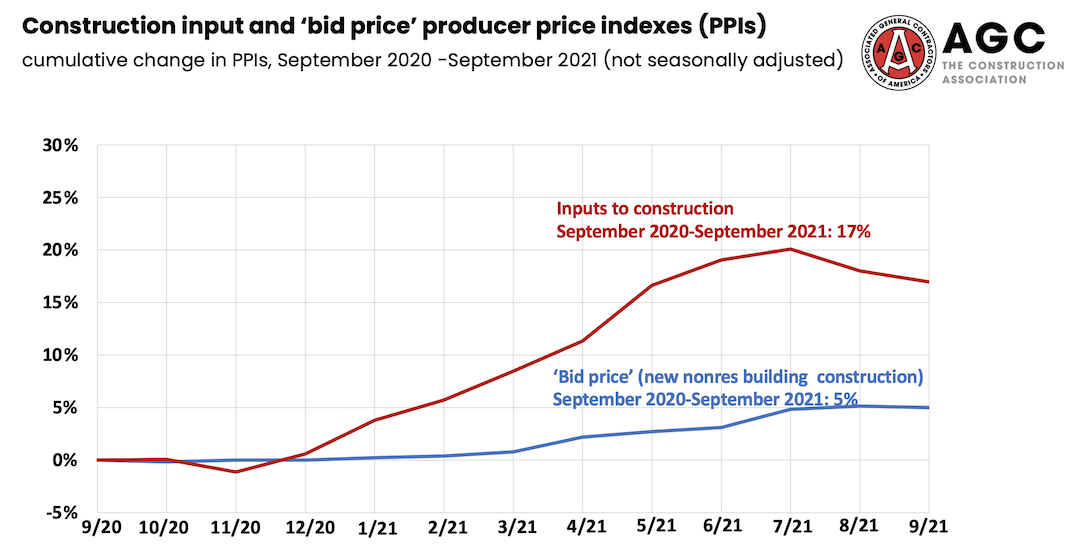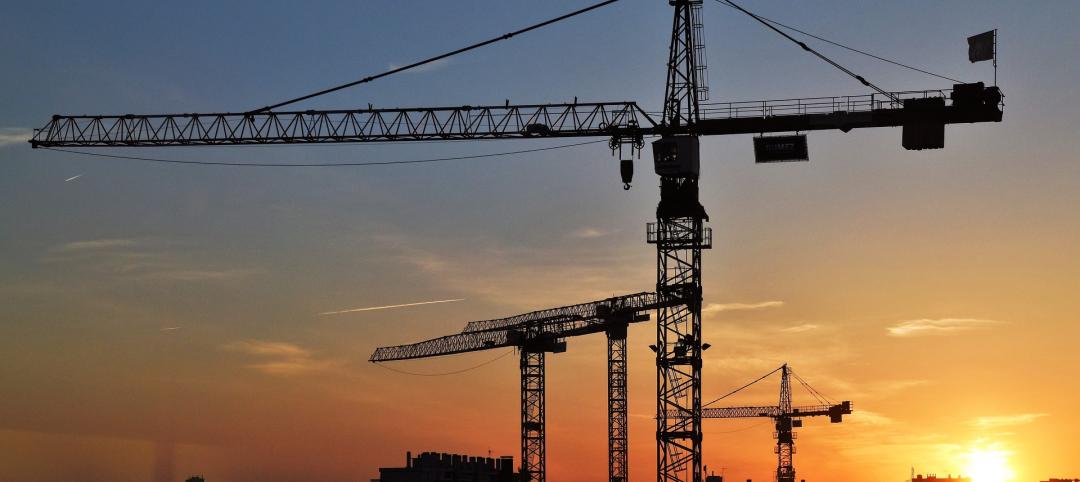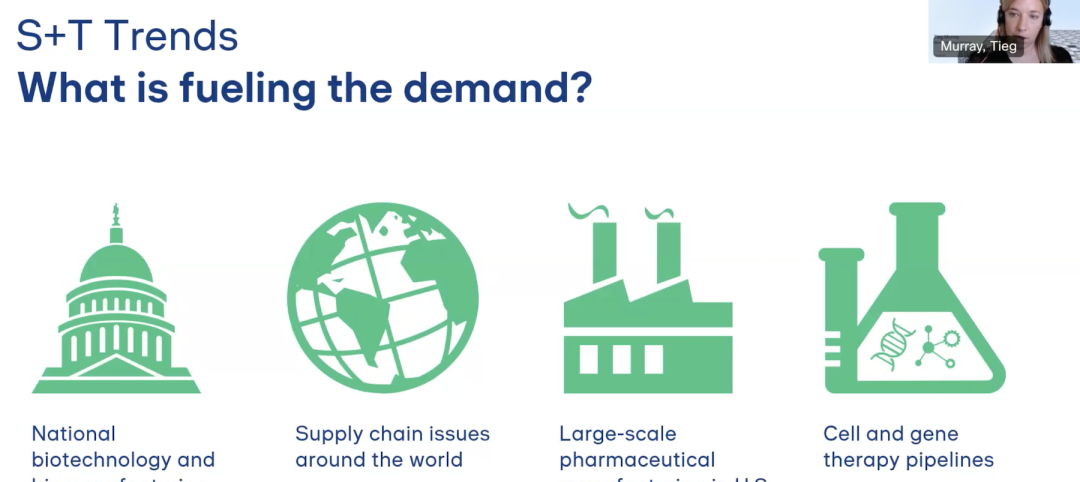The prices contractors pay for construction materials far outstripped the prices contractors charge in the 12 months ending in September, despite a recent decline in a few materials prices, while delivery problems intensified, according to an analysis by the Associated General Contractors of America of government data released today. Association officials urged Washington officials to end tariffs on key construction materials and take steps to help unknot snarled supply points.
“Construction materials costs remain out of control despite a decline in some inputs last month,” said Ken Simonson, the association’s chief economist. “Meanwhile, supply bottlenecks continue to worsen.”
The producer price index for new nonresidential construction—a measure of what contractors say they would charge to erect five types of nonresidential buildings—rose 5.2% over the past 12 months, despite a decline of 0.9% in the latest month. From September 2020 to last month, the prices that producers and service providers such as distributors and transportation firms charged for construction inputs jumped 17%, Simonson noted.
There were double-digit percentage increases in the selling prices of most materials used in every type of construction with the exclusion of lumber and plywood, which fell 12.3% during the past 12 months.
The producer price index for steel mill products increased by 134% compared to last September. The index for copper and brass mill shapes rose 39.5% and the index for aluminum mill shapes increased 35.1%. The index for plastic construction products rose 29.5%. The index for gypsum products such as wallboard climbed 23%. The index for insulation materials rose 19%, while the index for prepared asphalt and tar roofing and siding products rose 13.1%.
In addition to increases in materials costs, transportation and fuel costs also spiked. The index for truck transportation of freight jumped 15%. Fuel costs, which contractors pay directly to operate their own trucks and off-road equipment, as well as through surcharges on freight deliveries, have also jumped.
Association officials added that many contractors are experiencing extreme delays or uncertainty about delivery dates for receiving shipments of many types of construction materials. The association officials urged the Biden administration to immediately end tariffs on key construction materials. In addition, they asked for an all-out effort to help ports and freight transportation businesses move goods more quickly
“The tariffs on lumber, steel, aluminum, and many construction components have added fuel to already overheated prices,” said Stephen E. Sandherr, the association’s chief executive officer. “Ending the tariffs would help immediately, while other steps should be taken to relieve supply-chain bottlenecks.”
View producer price index data. View chart of gap between input costs and bid prices. View the association’s Construction Inflation Alert.
Related Stories
Industry Research | Dec 28, 2022
Following a strong year, design and construction firms view 2023 cautiously
The economy and inflation are the biggest concerns for U.S. architecture, construction, and engineering firms in 2023, according to a recent survey of AEC professionals by the editors of Building Design+Construction.
Self-Storage Facilities | Dec 16, 2022
Self-storage development booms in high multifamily construction areas
A 2022 RentCafe analysis finds that self-storage units swelled in conjunction with metros’ growth in apartment complexes.
Market Data | Dec 13, 2022
Contractors' backlog of work reaches three-year high
U.S. construction firms have, on average, 9.2 months of work in the pipeline, according to ABC's latest Construction Backlog Indicator.
Contractors | Dec 6, 2022
Slow payments cost the construction industry $208 billion in 2022
The cost of floating payments for wages and invoices represents $208 billion in excess cost to the construction industry, a 53% increase from 2021, according to a survey by Rabbet, a provider of construction finance software.
Mass Timber | Dec 1, 2022
Cross laminated timber market forecast to more than triple by end of decade
Cross laminated timber (CLT) is gaining acceptance as an eco-friendly building material, a trend that will propel its growth through the end of the 2020s. The CLT market is projected to more than triple from $1.11 billion in 2021 to $3.72 billion by 2030, according to a report from Polaris Market Research.
Market Data | Nov 15, 2022
Construction demand will be a double-edged sword in 2023
Skanska’s latest forecast sees shorter lead times and receding inflation, but the industry isn’t out of the woods yet.
Reconstruction & Renovation | Nov 8, 2022
Renovation work outpaces new construction for first time in two decades
Renovations of older buildings in U.S. cities recently hit a record high as reflected in architecture firm billings, according to the American Institute of Architects (AIA).
Market Data | Nov 3, 2022
Building material prices have become the calm in America’s economic storm
Linesight’s latest quarterly report predicts stability (mostly) through the first half of 2023
Building Team | Nov 1, 2022
Nonresidential construction spending increases slightly in September, says ABC
National nonresidential construction spending was up by 0.5% in September, according to an Associated Builders and Contractors analysis of data published today by the U.S. Census Bureau.
Hotel Facilities | Oct 31, 2022
These three hoteliers make up two-thirds of all new hotel development in the U.S.
With a combined 3,523 projects and 400,490 rooms in the pipeline, Marriott, Hilton, and InterContinental dominate the U.S. hotel construction sector.

















